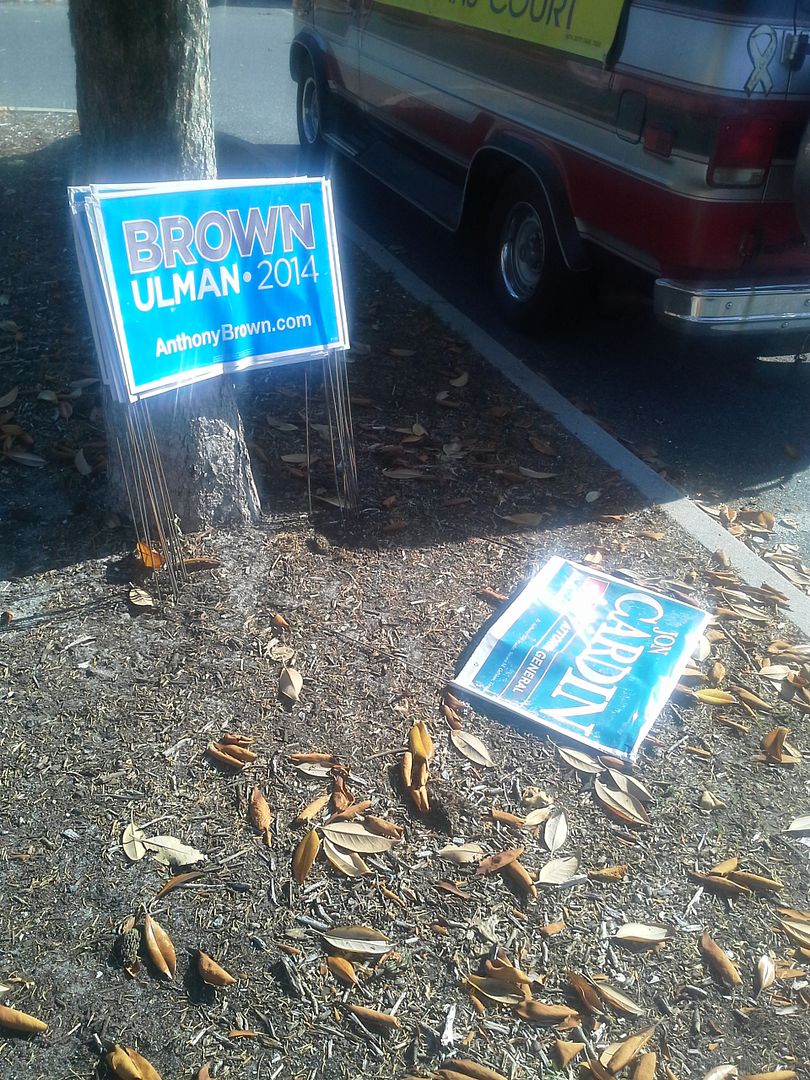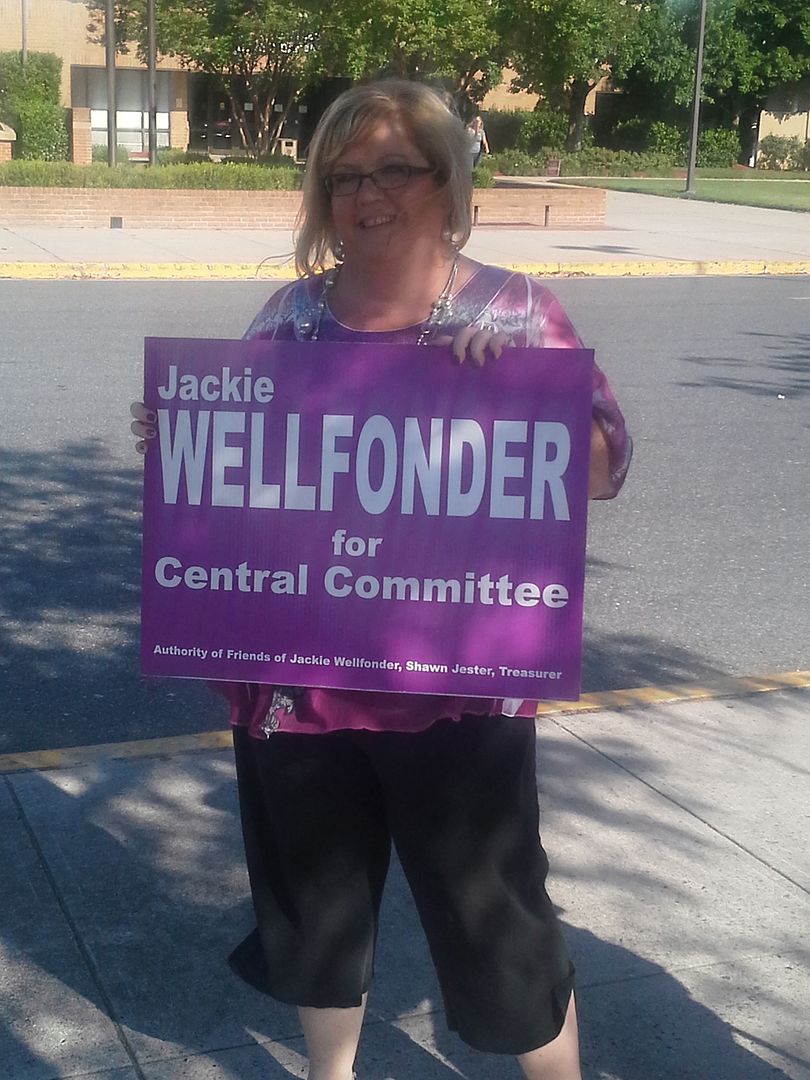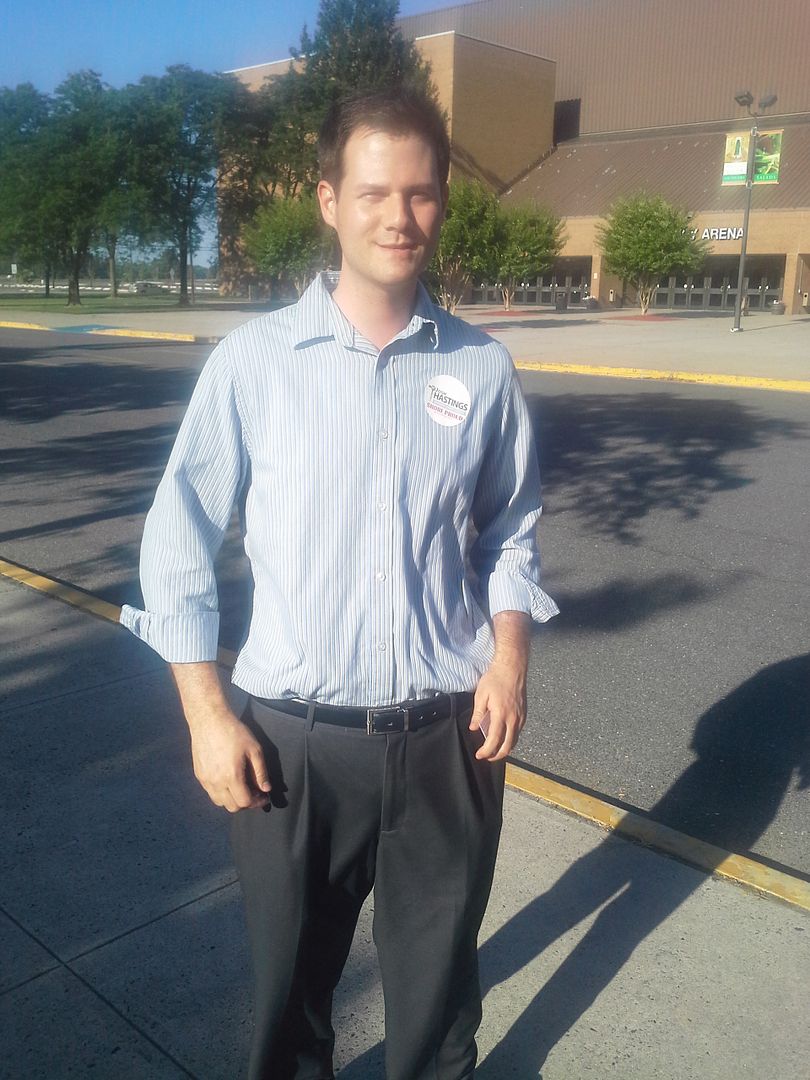On Friday I discussed the portion of the forum dealing with the aspirants for County Executive, so today I turn my attention to those running for the seven County Council seats. A total of 15 people are running for these seats, and 13 of them stated their case on Thursday night. Just as a reminder, the forum was hosted by the Wicomico County NAACP and its president, Mary Ashanti, and moderated by Orville Penn, a veteran of these affairs.
I’ll begin with the four who are running for two at-large seats – in order of presentation they are John Cannon, Laura Mitchell, Matt Holloway, and Muir Boda. They dealt with a little different set of questions, being queried about the prospects of funding the Chipman Center where the forum was held, the merits of an elected school board, an increase in the minimum wage, and thoughts on a race relations commission.
John Cannon served on the County Council as an at-large member from 2006-10 before an unsuccessful run for state delegate pushed him off the political stage. He agreed job growth and restoring our economic base would be “important goals to set,” believing that the pieces, such as the local universities and Peninsula Regional Medical Center, were in place and would be “the one tide which would raise all boats.”
Obviously John was kidding when he told moderator Orville Penn that “we’ll give you the Taj Mahal here” when referring to the Chipman Center, but he used that question as a springboard to state the case that the state had “absolutely ripped our budget” over the last few years through reductions in highway user money and passing along teacher pensions, among other things. We would have to figure out how to raise money on our own, continued John, and job growth was key. “We’re not going to increase taxes,” said Cannon, but if we can improve the economic situation we can “look after citizens as a whole” and try to find resources for needs such as the Chipman Center.
“I would like to see an elected school board,” said Cannon. He respected the Board of Education’s work, but would like to see more accountability because he was concerned about their audit. Moreover, while spending for the rest of government was perpetually on the chopping block during his previous tenure on County Council, he “never felt as if the school board was really on board to make the same cuts that they should have been doing.”
As for the minimum wage, Cannon asserted that at least one of two things would occur if the minimum was raised, if not both: overall price inflation and cuts in hours and jobs. He reminded the audience that the CBO predicted at least 500,000 jobs lost nationwide if the national minimum was increased to $10.10 an hour and that only 19% of the individuals below poverty level would be helped. The alternative, John continued, was an increase in the earned income tax credit, whether at the state or federal level.
A commission on race relation “would be a great idea,” Cannon said. He advocated “asset building,” where all local resources are brought together to address the issue. He concluded his remarks by noting that serving on the Council heightens awareness and is like getting a “master’s degree in all areas.”
A current elected official in a similar office is seeking a Council seat as well. Laura Mitchell was elected to Salisbury City Council in 2011 and is running from the cover of that seat for a county post. But in addressing those who believe government should be run like a business, she said, “really, you don’t, because businesses are there to make a profit, and we don’t want our government to make a profit. They should do exactly what their mandate is.” She’s tried to instill that in the city and wants to bring it to the county.
“There is a role for the county to play” in restoring the Chipman Center, said Laura. It could be the “connector” for funding and volunteers, but she agreed there is some responsibility for the city and county.
Regarding the school board, Mitchell told those assembled that “as far as I would be willing to go is a hybrid” school board with both appointees and elected members. Rather than being more accountable, she thought those elected would be more beholden to their donors and not the students. She argued that there’s a balance with an appointed board, and that members who serve at the pleasure of the Governor could be more easily removed as opposed to conducting a recall election.
Laura was in support of a minimum wage increase, asserting many who would be helped were single mothers; furthermore, “minimum wage needs to keep pace with inflation…it would be at about $10.40 had it kept pace.” As for employers, “this is one of those costs of doing business,” said Mitchell, lumping it in with other costs such as materials. She argued that it would be better to raise the minimum, otherwise “it’s more beneficial for them to sit home and collect a check (because) they can’t afford to go to work.”
A race relations committee was a great idea, but the need was larger than just a committee would provide. “It is our job to start that conversation,” she added. But with several different organizations chasing the same goal, an “asset map” would be helpful in determining a course of action, although the existing Safe Streets program is already working in that direction.
After remarking how she loves learning new things, Mitchell concluded that while she loves what they’ve been able to do at the city level, she’s run into some “stumbling blocks” on the county side – we needed more partnerships between the county and municipalities.
Of the two current at-large members of County Council, only Matt Holloway is seeking re-election as Bob Culver is running for County Executive. He originally ran in 2010 to provide a perspective from the agricultural community, stressing property rights. In the time since he’s come on board, he’s become the “bridge builder,” believing the relationship with the County Executive “is stronger than it’s ever been,” as is our relationship with the state. Matt also touted his membership on two governor-appointed committees, the Sustainable Growth Commission and the Critical Areas Commission. “I bring a lot of things to the table,” said Matt.
Restoring historic buildings was one of the county’s functions, remarked Matt regarding the Chipman Center, much like the county has an interest in keeping up the Pemberton estate and the old courthouse, which is in need of renovations. County government “could play a role” in resoring Chipman.
Matt also favored an elected school board, touching on Mitchell’s objection because he felt it would be a good thing if members felt like they owed someone. “They would feel like they’re responsible to the taxpayer,” said Matt. “It’s about accountability.” He was okay with a hybrid board as an interim step.
In discussing the minimum wage increase, though, Matt conceded the county has little role. But an increase “could be very detrimental” to the climate they were trying to create with recent tax reforms. “I don’t think the time is right,” said Matt.
Matt argued that many of the current committees formed by the Council were already diverse, but before establishing a citizens’ race relations committee, we should get the key players together and “come up with a game plan first.” He concluded in his closing remarks that he had helped the minority community by improving education, law enforcement, and business.
Muir Boda is no stranger to the ballot; this is his fourth run for elective office after bids for Salisbury City Council in 2009 and 2011 and Congress in 2012.
But he saw they key issues as a three-legged stool, with curtailing crime, providing educational opportunity, and improving the economic climate being the three legs. “All three have to work,” said Boda.
In restoring the Chipman Center, Boda would support a partnership between the county, city, and Community Foundation – they would be “the avenue we could go through first.” They could help raise the appropriate funds.
While Boda also preferred an elected school board, he also had a stipulation for a hybrid model where appointees would be determined locally rather than by Annapolis, which has no local accountability.
Since Muir has a position where he works with a lot of younger workers who make minimum wage, he could point out that there were a lot of things they could not legally do, such as run machinery. They were only useful in certain positions. Small businesses would cut positions and hours, he argued. “We have to understand what entry-level positions are to companies,” added Boda.
Boda returned to his three-legged stool analogy in describing his thoughts on race relations, citing the High Point initiative as well. “Everything has to be seamless…if you have skyrocketing crime rates, it’s going to affect companies that want to come here and invest in our community,” said Muir. “This (commission) is one piece of the puzzle.” He got to buttress his points because he gave his closing statement immediately after his answer to the previous question.
Compared to the lengthy segment dealing with the at-large Council candidates, the district races were quite brief.
In District 1, two of the three contenders came to discuss the issues.
McKinley Hayward was making his second try at the District 1 Council seat, having lost in the 2006 primary to current seatholder Sheree Sample-Hughes. If elected, he said, “I don’t want to be a political figure, I want to be a working figure for Wicomico County.”
When asked what the three biggest challenges to Wicomico County were, Hayward cited four: “empowering our community through jobs, education, housing, and employment.” Creating a good job which would enable workers to invest in their own homes was his goal, and Hayward saw high-tech jobs as the ticket. “I want Rick Pollitt to hear this – we need to invest in our future,” Hayward said. “Fruitland had a vision,” he continued, but what about the Mardela end of the county? Thousands go to Ocean City every weekend, but “we don’t get a dime of that money.”
The key to doing that would be encouraging vocational education and on-the-job training. “You could be a barber and be successful – every man in here has to get a haircut,” exclaimed Hayward. He went on, “Every kid that graduates from high school should graduate with a resume.”
As for the idea of a race relations committee, McKinley didn’t know if that would solve the problem. He saw it as something more deep-seated.
“I run a playground during the summer at Lake Street,” he said. “My kids see a policeman, they run from him…the only time a black kid sees a policeman, he thinks he’s coming to arrest someone.” It’s a “stigma” we need to get out of in Wicomico County, added Hayward. But if he wins, “no one’s going to be safe” in government because he would do what he feels is best for the county.
One of two opponents for Hayward, Ernest Davis, cited his experience with the Maryland State Police and two businesses he’s created, along with his belief that “I’m a working person” as part of his calling card. His key issues were education, economic growth, and agriculture. This worked out well with the next question, where Davis expanded on these issues, particularly in agriculture. He warned that phosphorus regulations could hurt the local agricultural industry, leading to dire consequences. We also needed to promote our county’s educational institutions and proximity to Wallops Island. “That thing is growing leaps and bounds,” Davis added.
Davis also advocated bringing all the parties to the table in dealing with race relations, rather than pulling in several different directions.
But returning to his three main points for his close, Ernest believed that, “Wicomico needs to start tooting its own horn (and) standing on its own two feet.”
The third candidate in the District 1 race, Marvin Ames, was absent from the forum. Similarly, District 2 candidate Kirby Travers missed the affair, giving Marc Kilmer an opportunity to go through his first forum without any opposition.
So Marc got to speak about those things he wanted to accomplish in making the county better for his two young children: education, having a safe community, and jobs.
The District 3 race had all three contenders, and drawing first blood for them was former County Council member Larry Dodd, who served there from 2002-06. Since 2009 he’s been a member of the Wicomico County Board of Education. It was in that vein he noted, “I’m here for your kids and the future of Wicmico County.”
In discussing job creation, Dodd made the case that “I believe in smaller government,” but maintained that education, crime control, and economic development were indeed legitimate functions of government. He praised the local vocational programs and the efforts in place to control crime, but the key was keeping kids in school.
Common Core was an issue which was brought up, but Dodd conceded it can’t be scrapped because “it’s state mandated.” But “we are working to make it better and usable,” said Larry.
Dodd chose to close in part by thanking current District 3 Council member Gail Bartkovich for her service, touting his experience and skills and pointing out “I’m invested in this community.”
In contrast, Josh Hastings was making his first run for office. His background is mainly in the land protection and environmental fields, including the Rural Maryland Council and a stint in the office of the chair of the Maryland Senate’s Education, Health, and Environmental Affairs Committee. “I’m here to protect our farms and our rural industries,” said Hastings, who would build on relationships across the state and the Shore.
Hastings didn’t believe it was the role of government to create jobs; rather, it’s the council and executive’s job to use dollars wisely and efficiently. But he felt they should have a say in how an area looks and grows.
He also admitted he didn’t know enough about Common Core to have an opinion, but would listen to the teachers.
Josh concluded that it should be possible to be the number one county in the number one state for education. We also needed to build upon what makes us special and unique, and he would “continue to build the relationships” to assist in that.
After two unsuccessful runs for County Executive, Tom Taylor decided to try for the legislative branch this time. To begin, he claimed that he “wanted to represent the largest minority in Wicomico County – the individual.” People needed to realize that Annapolis is taking our local representation away – “things are getting out of your control…we have to get control of these things.”
Taylor had an interesting take on job creation as well. “It’s not the role of government to make sure everyone has a job,” said Tom. “The role of the government is to protect individual rights and property, and protect people so they can create these jobs.” Just give businesses the opportunity to create jobs by minimizing government intrusion, said Tom.
When it came to the core curriculum, Taylor was blunt. “I don’t like my son and his education being an experiment in social engineering.” Instead, we have to rubber-stamp everything which comes from Annapolis. His goal was to maximize classroom spending.
If elected, concluded Taylor, he vowed to fight for our Constitutional and property rights. “I’ve taken it to Annapolis before,” Tom said. “I’m more of a pit bull than the lovable person you see here.” We should accomplish our goals without the fear of government intrusion.
Our final segment combined both Districts 4 and 5 because District 4 Council member John Hall is unopposed for a full term.
Hall assessed the current situation thusly: “There is a light at the end of the tunnel, and my job is not to extend the length of the tunnel.”
The first question for the group was on racial disparity in jobs and housing, and Hall agreed “we have racial and economic disparities.” While we could have committees and asset maps, “education is going to be the key.” There should be more opportunities for the 36% of Wicomico County residents who are minorities. And when asked how the Board of Education could be more efficient, Hall advocated for an elected board.
But in his conclusion, John conceded “we’re living in a difficult time.” He also asked people to be “role models, not roadblocks.”
Representing District 5 since 2006, Joe Holloway reminded us that “we started in the recession.” And among those tough decisions to slice up the financial pie, finding out about the Board of Education audit was “very disappointing.” He even was surprised to agree with the Daily Times assessment of the situation as a “financial failure.”
Assistance in getting jobs back would come from reducing the impact fees, which now seems to have the County Executive on board because much of that housing growth was going to Sussex County, Delaware. As for raising the minimum wage, “I have a little problem with raising the minimum wage.” It’s a “training ground,” he continued. Moreover, the salaries of those who make a little bit over the minimum would have to go up as well. “I see a big jump in unemployment,” Joe said. He hoped that $10.10 was just a negotiating ploy and a lesser amount would be acceptable.
“It’s no secret I support an elected school board,” continued Joe. And it was an issue where, despite the fact that those things the Board of Education was spending on were within their policies, Joe reminded us he had “caught hell” for bringing up these same problems five years ago. An elected school board would be a good “first step.”
And after picking on the school board, in his conclusion Joe decided “to pick on Annapolis a little bit.” He warned that “if we’re not careful, Annapolis is going to run the poultry industry off the Eastern Shore…we will be a ghost town.” Everyone in county government was on board with that, and while the idea of job creation was great we need to consider how to keep the jobs we have. “We’re not sitting up there twiddling our thumbs,” concluded Joe.
Ron Pagano had a different tack on many issues. As an job creator and advocate for the disabled, among other groups, he wanted to provide equal opportunity, better housing, and improved public transportation, which was a cause dear to him. He wanted to keep our kids here, as “our kids should always be part of our vision.”
Ron also vowed to “talk to anyone about job creation,” but differed from most of the others in supporting a “fair” minimum wage. “$7.25 an hour is not enough to raise a family, let alone doing anything outside buying bread and milk,” said Pagano. A smaller minimum also drives up the cost of the SNAP program, he argued.
He also took a moment to express his support of a “biracial commission,” recalling a similar organization existed in the days when U.S. 13 and U.S. 50 were built and that era’s “tearing apart of neighborhoods.”
Pagano agreed the Board of Education audit “isn’t pretty,” but wanted to see what the Sage Policy Group report had to say. But he defended the Board, stating “as an attorney, I always knew there was two sides to every story.” He was against an elected board, saying “the problem with an elected board is that no one wants to run,” particularly with the financial disclosure reports required. He also pointed out the “balance” between parties.
He summed up by revisiting job creation. “I want to focus on bringing jobs to this community,” noting that Wor-Wic Community College will customize training programs to various companies. Ron also sought to establish partnerships, particularly with NASA Wallops: “I personally will go to NASA Wallops and speak to the director there – I’ll speak to whoever wants to create jobs here.” Given that we have job creators like Jubilant Cadista – which, Ron noted, has created 300 local jobs in the last 7 years and is on track for 200 more – “obviously there is something about Wicomico County that appealed to Jubilant Cadista, and we can appeal to others as well. I will promise you I will bring jobs to the county,” Pagano concluded.
After 2 1/2 hours, the forum came to a close and the 60 to 70 people who crammed into the room went their separate ways. Among those offices covered in the event, the fields for county executive and County Council Districts 2 and 5 are set since only one from each party filed. District 1 will be decided in the Democratic primary since no Republican filed, and District 4’s John Hall is unopposed. Out of all those there, only one District 3 aspirant and one for at-large will be eliminated.
But the event was useful in staking out some positions, and there will likely be several more forums for candidates to attend in upcoming weeks.







